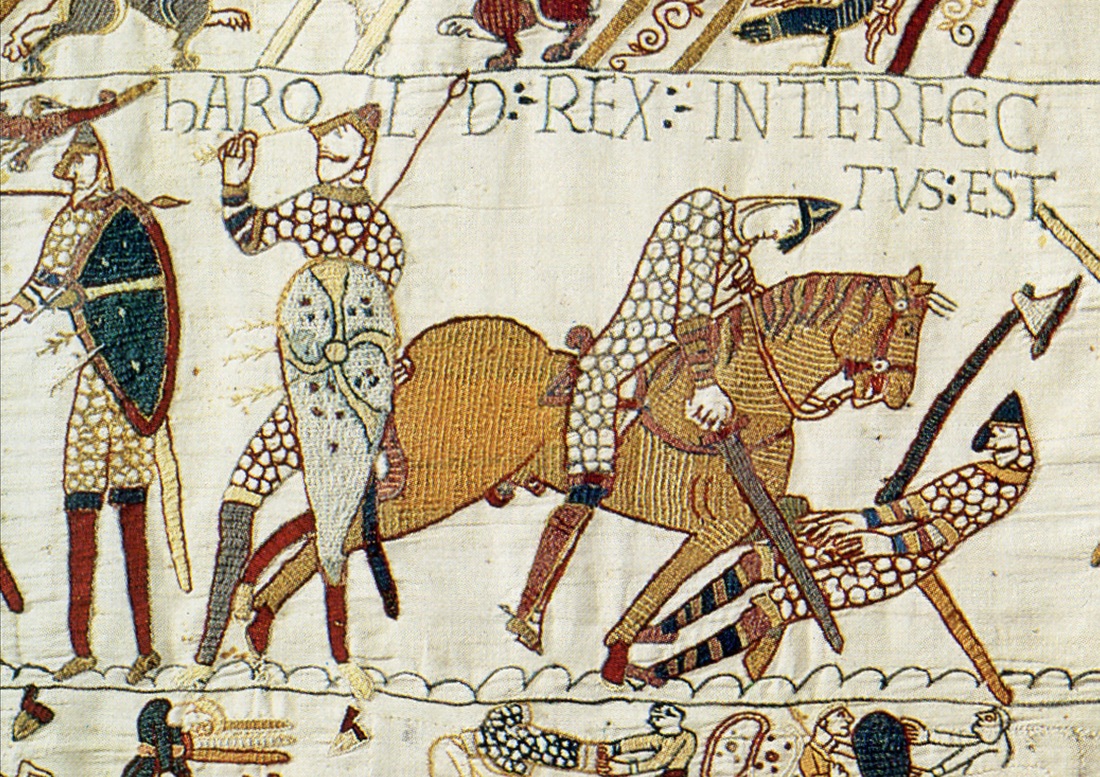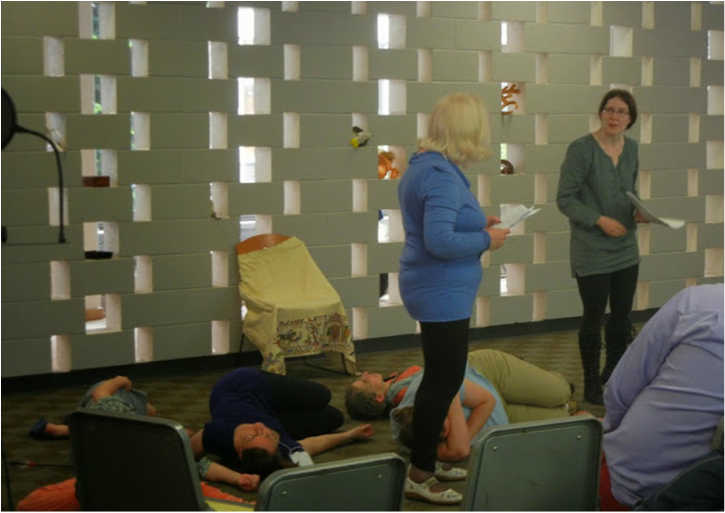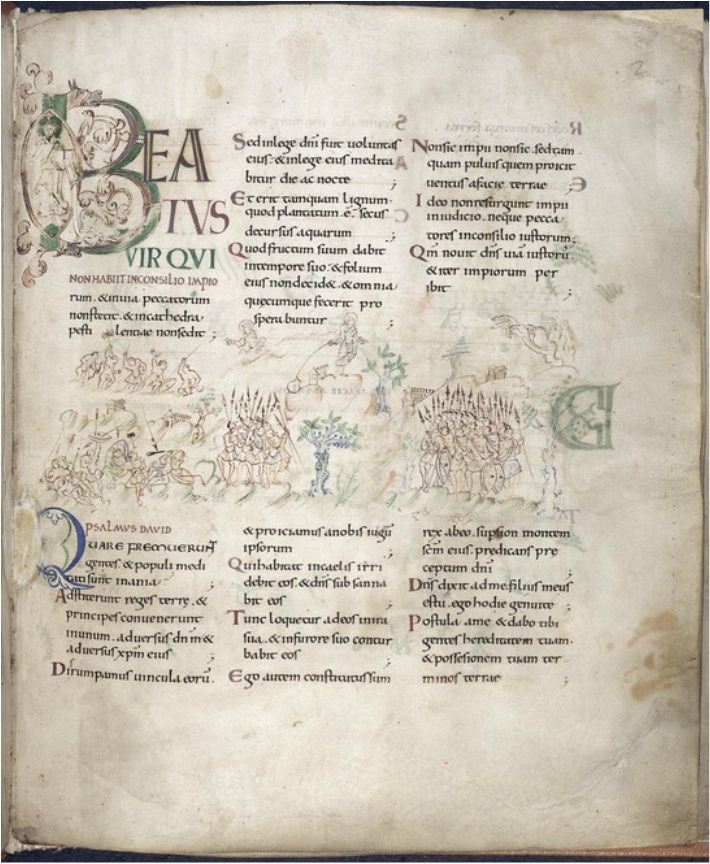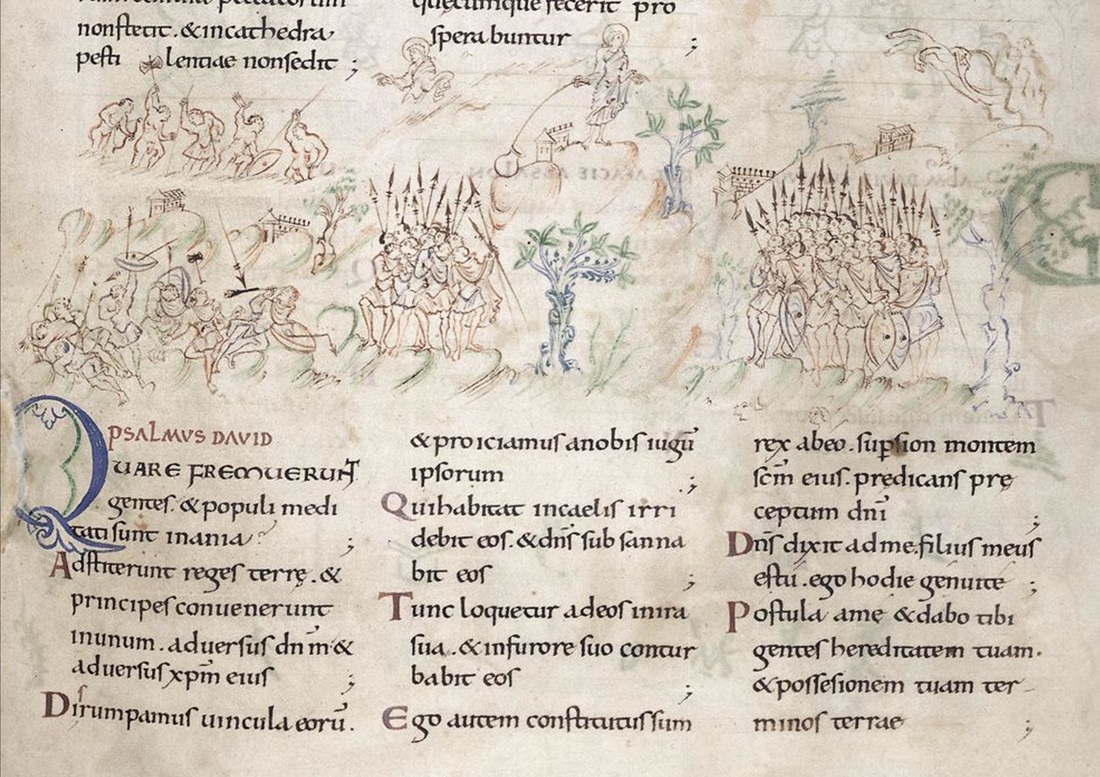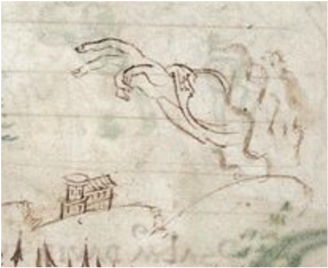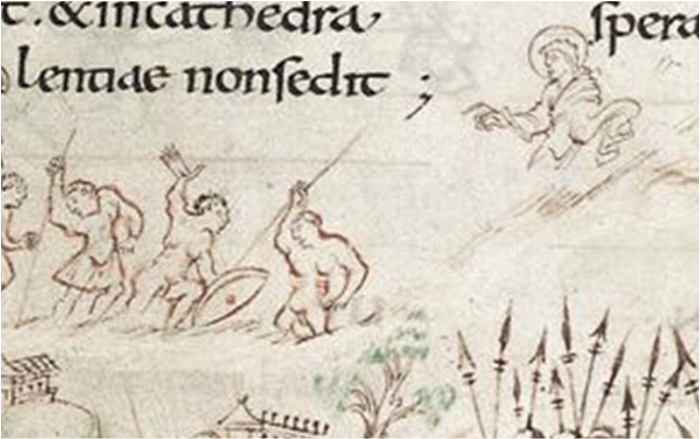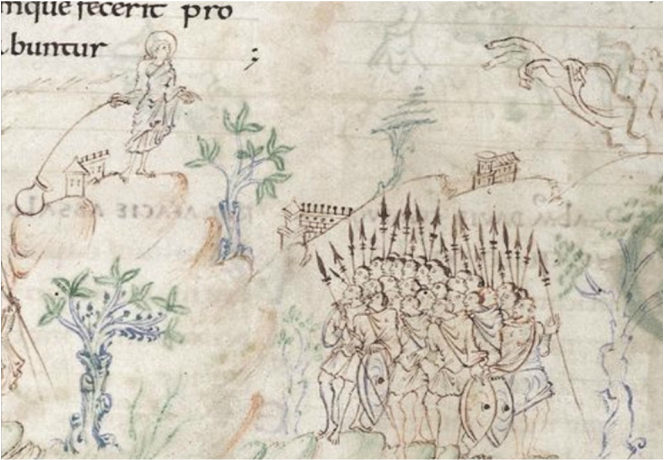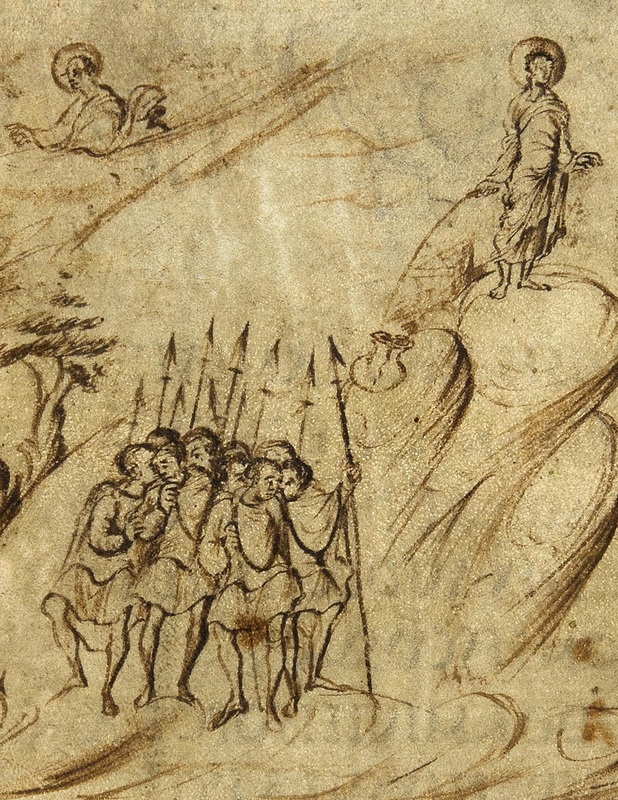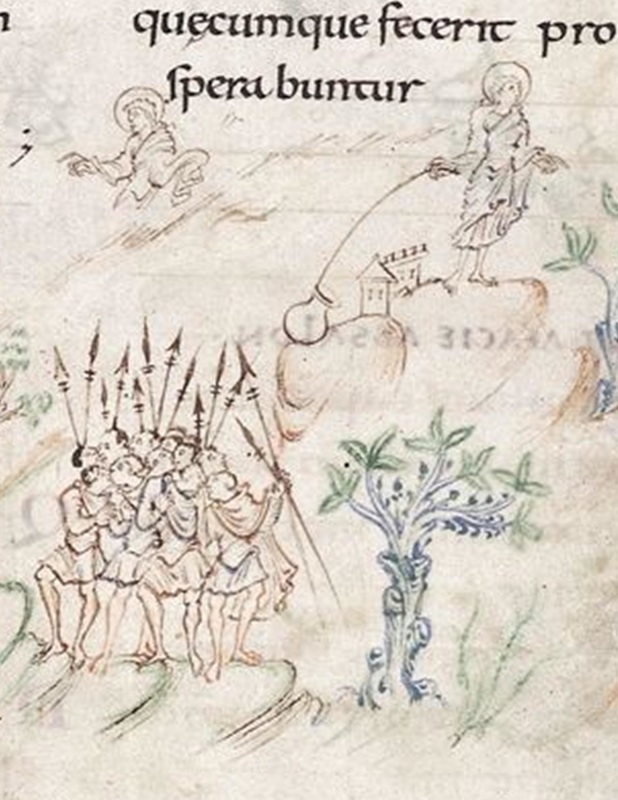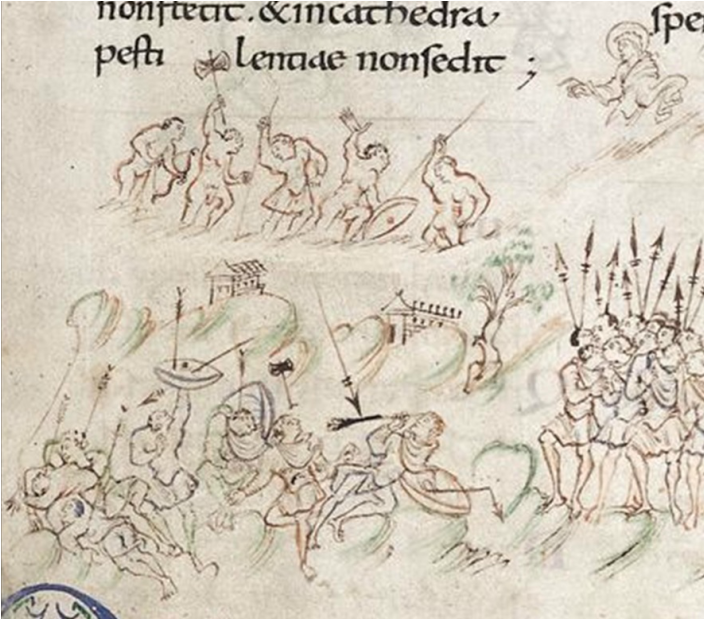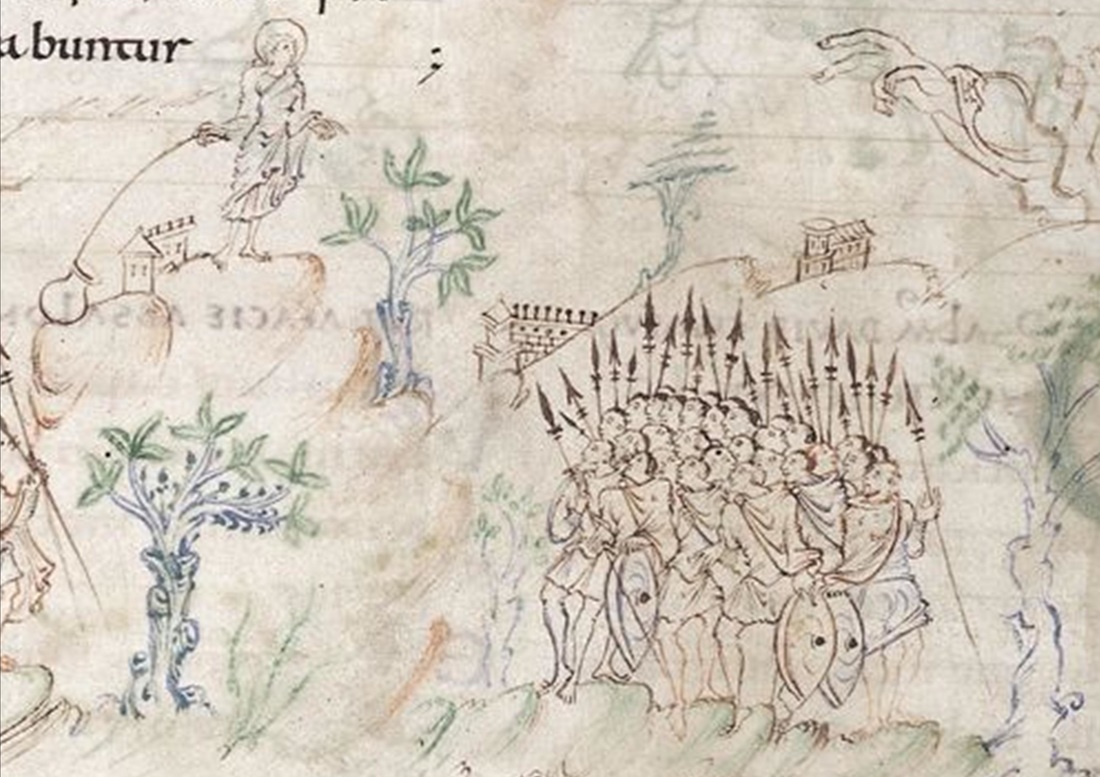|
The Anglo-Saxon Monk announces the release of the filmed version of Daisy Black's adaptation of the Bayeux Tapestry. THINGS don't always move speedily here in my eleventh-century monastic world. I have so many things to do, beloved, as I'm sure you can appreciate. However, blessed readers, after weeks of saintly toiling and copious quantities of sweat that even King Harold himself would have been proud of, I take great pleasure in releasing the edited film version of The Stitches Speak, the dramatic adaptation of the Bayeux Tapestry written and directed by the intrepid Daisy Black, and performed in honour of Gale Owen-Crocker as a rehearsed reading at the 50th International Congress on Medieval Studies, held at Kalamazoo, Michigan, USA. So make yourself comfortable, gather your strange beverages and foods (someone please explain 'pop corn' to me), and simply click on the button below. And I want no rude comments about a certain monk's 'Mersey Beat' wig!
4 Comments
More frustration and shouting. The Anglo-Saxon Monk continues his game of visual clues in his exploration of the marvellous Harley Psalter... WELCOME BACK, blessed readers, to my Harley Psalter charades. If you missed the first instalment, complete with my insightful introduction to this most wondrous of Anglo-Saxon manuscripts and my enlightening explication of the concept of manuscript charades, well, shame on you! But I will show mercy, as a good monk should. If you now feel the appropriate remorse and mortification of your soul at neglecting the Word of God, then fair enough: you can catch up here. So push back your mead-benches, and gather your senses. It's time to work out the visual clues of Psalm 2. And we must start with the primary characters, the Lord and his Christ.
A fuller version of the Lord is located to the left of the claw, I mean hand, jutting above a wispy cloud. How do we know it's the Lord? Because he not only wears classical garb (no Anglo-Saxon tunic for God) but also a nimbus, or halo. Moreover, the Lord regularly sits on clouds and directs things, as you see here (more about those he is directing in a moment). Also the Lord doesn't have any wings, so he's no mere angel. So there's your first answer, beloved: this is he who dwelleth in heaven. So what about the Lord's Christ? Well he's the other figure at the top with a nimbus, though it looks like the artist forgot to put the cross inside it. Sloppy. As you can see, below, the Christ is also standing on a splendid mountain. What do you mean it's more like a hillock? This is Christ we're talking about. Trust me, it's a mountain. Can't you see those tiny little buildings? It's a mountain! You will have noticed, I'm sure, that the Christ is also waving around something cane-like with his right hand and it looks like he's about to overturn a pot. Before we expand our analysis of that, however, I just want you to recognise that the Christ is with his other hand pointing to a tree. Or maybe he's pointing beyond the tree to that tight-knit group of spear-wielders. What do you think? The latter is more likely. Why would anyone point at a tree? Though I must confess, this tree doesn't seem to be doing as well as the other tree directly below Christ, which is rather reminiscent of the lovely fruit-yielding one in Psalm 1. Perhaps Christ is particularly fond of horticulture, and he's advocating better care for all trees. However, I should just tell you that in the Utrecht Psalter, of which our Harley Psalter is a copy, there is no fruiting tree! So make of that what you will. This is charades, you know, it's not meant to be easy. All this talk of trees is distracting us from our task at hand. We need to concentrate. Remember, we're looking for clues to words or phrases found in Psalm 2. Let's go back to Christ and his pot tapping, and widen out our intellectual gaze. Now, beloved, just what is the Christ up to? And what should we make of this group of short tunic wearers below Christ's pot? Tough, this one. I think we should perhaps take a look at the Utrecht Psalter to see if it gives us any clues. Aha! That potter's vessel is cracked! That's no light-weight cane in Christ's hand. Why, it must be a rod of iron! Oh, that does not bode well for those fellows below. Christ smashing a pot to pieces with his iron rod: a metaphor, perhaps? But just who are they? It's a little easier to see in the Utrecht original that they're having a bit of a natter, as my dear grandmother would have said. I know, I know, 'natter' is a nineteenth-century word! But I'm not the only time-travelling Anglo-Saxon: my ancestors got around a fair bit. Actually, 'natter' in its original nineteenth century context may just give us a clue, since it was used back then to mean 'grumble'. Yes, got it! These despicable fellows are grumbling at Christ. In fact, I would say they are going as far as raging against him. And look at how their heads are so close together (they actually look like they're kissing in the Harley Psalter, very dubious). I can tell you right now, blessed ones, they are up to no good. I bet they are devising vain things, I'm quite sure of it. But who are they? They must be... of course! Gentiles! How could we have missed the obvious? Thank you, grandmother. Now we're getting some momentum, beloved. Let's see what's happening on the left. First, notice that the Lord God is doing some efficient directing from his wispy cloud. He looks like he's getting a bunch of five heavenly warriors (some rather lacking in clothing, it has to be said) tofire arrows and hurl spears and axes down to earth. And they're hitting their targets. Well, mostly. I'm not sure why the English artist saw it necessary to expose the buttocks of one of the dead men, mind you. Most unsavoury. In case you haven't worked out the meaning here (may the Lord have mercy on you), this is a depiction of divine rage. God is allowed to get angry, never forget that, my blessed ones. But he quite often does it indirectly, through angels, for example. If you doubt these five are angels, then let me just tell you that the Utrecht Psalter shows them all with the most splendid wings. Our English artist was clearly far too busy with other, less salubrious details! Are we not having fun? You there, at the back, wake up! We've still one more visual clue to work out: who are those other fellows that Christ is talking to? So, beloved, we got over the distraction of the trees, didn't we, but are we really any the wiser as to who this group of spear-wielders are? Well, actually, they're not really wielding spears, are they? Rather, they're just standing around looking rather attentive towards the Christ. Aha! These are good spear-wielders, listening to our Lord, receiving instruction, embracing discipline, trembling with both joy and fear. Can't you just feel it, beloved?!
Well, there we have it, all done and dusted. Another Psalm, another game of medieval charades. But just so that you fully understand that my duty here towards you all, beloved, is that I expound spiritual truths for your edification and, somewhere down the line, your eternal blessedness, please make sure you do your homework by memorising Psalm 2 in its entirety (key words and phrases are underlined): Psalm 2 1 Why have the Gentiles raged, and the people devised vain things? 2 The kings of the earth stood up, and the princes met together, against the Lord, and against his Christ. 3 Let us break their bonds asunder: and let us cast away their yoke from us. 4 He that dwelleth in heaven shall laugh at them: and the Lord shall deride them. 5 Then shall he speak to them in his anger, and trouble them in his rage. 6 But I am appointed king by him over Sion, his holy mountain, preaching his commandment. 7 The Lord hath said to me: Thou art my son, this day have I begotten thee. 8 Ask of me, and I will give thee the Gentiles for thy inheritance, and the utmost parts of the earth for thy possession. 9 Thou shalt rule them with a rod of iron, and shalt break them in pieces like a potter's vessel. 10 And now, O ye kings, understand: receive instruction, you that judge the earth. 11 Serve ye the Lord with fear: and rejoice unto him with trembling. 12 Embrace discipline, lest at any time the Lord be angry, and you perish from the just way. 13 When his wrath shall be kindled in a short time, blessed are all they that trust in him. The Anglo-Saxon Monk is always delighted to hear from his readers, so if you feel moved to add your own interpretation of Psalm 2, please do not hold back, just leave a comment below. |
Details
|


